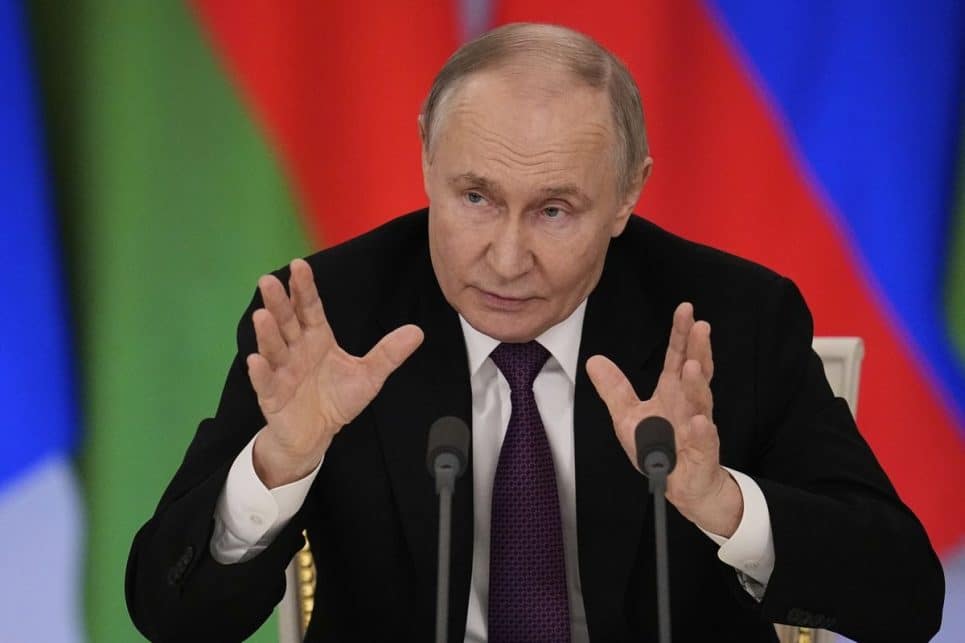Russia Announces Ceasefire in Ukraine for WWII Victory Commemorations, While U.S. Considers Role in Peace Efforts
Russian President Vladimir Putin has announced a three-day ceasefire in Ukraine, from May 8 to May 10, to coincide with Victory Day, the national holiday marking the defeat of Nazi Germany in World War II. The Kremlin stated that the ceasefire, which begins at midnight on May 8, is being enacted on “humanitarian grounds.”
This move comes amid growing international pressure to end the ongoing war in Ukraine — now over three years long — and as the Trump administration debates whether a peace deal is within reach.
U.S. Pushes for Ceasefire as Tensions Remain High
In the lead-up to the ceasefire announcement, both sides continued to launch attacks. Russia claimed to have shot down 119 Ukrainian drones overnight, mostly near its Bryansk border. Meanwhile, air raid sirens were heard throughout Ukraine on Monday, though no casualties were immediately reported.

Despite the announcement of a temporary truce, deep mistrust lingers. Up until now, Putin had resisted calls for a full ceasefire, tying it to demands that Western countries stop sending weapons to Ukraine and that Ukraine halt its military mobilization.
U.S. Secretary of State Marco Rubio emphasized the importance of this week, calling it “very critical” for determining whether the U.S. will stay involved in trying to broker peace. Speaking on NBC’s Meet the Press, Rubio said the administration must decide “whether this is an endeavor that we want to continue to be involved in.”
Trump Skeptical of Putin’s Intentions
Over the weekend, former President Donald Trump expressed doubt over Putin’s commitment to peace, pointing to continued Russian missile strikes on Ukrainian cities. Still, he called a potential peace deal “close,” signaling cautious optimism.
Western European leaders have accused Russia of delaying talks to gain more territory, leveraging its larger military force. On Sunday, Russian Foreign Minister Sergey Lavrov and Secretary Rubio reportedly discussed laying the groundwork for negotiations, though details remain vague.
Russia has dismissed a U.S.-backed proposal for an immediate 30-day ceasefire, attaching what the White House calls “unrealistic conditions.” Ukraine, on the other hand, has accepted the plan, according to President Volodymyr Zelenskyy.
A French official said over the weekend that Trump, Zelenskyy, and French President Emmanuel Macron are continuing to work toward a “solid ceasefire,” which they see as a prerequisite for any meaningful peace talks.
Ukraine Refuses to Trade Land for Peace
One major sticking point is the possibility of Ukraine ceding territory to Russia — something Ukrainian leaders firmly reject. The Trump administration has suggested territorial concessions could be necessary for peace, but Kyiv remains adamant that any agreement must respect Ukraine’s sovereignty and constitutional boundaries.
In a related development, Ukraine and the U.S. are reportedly advancing talks on a strategic minerals deal that could give America access to Ukraine’s rich mineral resources. Ukrainian Prime Minister Denys Shmyhal confirmed progress in negotiations with the U.S. Treasury, stressing that any deal must comply with Ukrainian law and European commitments.
Russia’s International Backing
Russia’s war effort continues to be supported by allies abroad. On Monday, Putin thanked North Korea for reportedly sending troops and supplying artillery. U.S. officials also say Iran has provided drones, while China has supplied manufacturing equipment and microelectronics that could be used in weapon production.
Since Russia’s full-scale invasion in February 2022, the war has escalated into Europe’s biggest conflict since World War II, drawing in international players and complicating diplomatic efforts.
